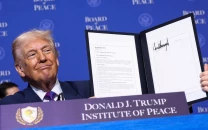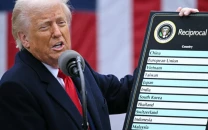Kerry-Hagel, a new era of US-Pakistan relations?
Kerry and Hagel appointments are good news, will entail more pragmatic approach towards US foreign policy in future.

The writer, a native of South Waziristan, has a master’s degree in conflict resolution from the Monterey Institute of International Studies in California and blogs at http://coffeeshopdiplomat.wordpress.com/
During his Senate hearing, Kerry stated that “American foreign policy is not defined by drones and deployments alone”. He has always been considered a friend of Pakistan and has been deeply involved in the US morass in Pakistan and Afghanistan. He is familiar with the issues afflicting the region and played a key role in pushing through the Kerry-Lugar-Berman aid package to Pakistan. The US has utilised Kerry’s skills numerous times to diffuse various crisis situations in Pakistan from the Raymond Davis shootout to the post-Bin Laden raid turmoil. Kerry also had to intervene several times on behalf of the late Richard Holbrooke, special envoy to Afghanistan and Pakistan. It has been reported that Holbrooke did not have many friends in the White House and he relied on Kerry to express his views to foreign leaders.
Kerry and Hagel have much in common from being veterans of the Vietnam war to opposing the Iraq war, even though the latter originally voted for the Iraq resolution. During the Senate hearing in response to a question regarding the effectiveness of US aid to Pakistan, Hagel retorted that more terrorists have been killed in Pakistan than anywhere else since 9/11 and this would not have been possible without Pakistan’s cooperation. Hagel added that “security assistance for Pakistan has helped Pakistan press this campaign against the militant and terrorist networks that threaten us all”. He admitted that the relationship between the two countries is challenging but also reaffirmed that they both have the same long-term strategic interests.
Hagel is being criticised by the Republicans who accuse him of being anti-Israel since he stated in 2006, “I’m not an Israeli senator. I’m a United States senator.” This fact should be obvious to all the voters who elect US representatives and not representatives of foreign countries. His statement goes to prove that he will not be bullied by foreign lobbies and that is an excellent sign for Pakistan since its lobby is not near as strong as others.
A third major appointment is that of John Brennan as director of CIA. However, since the CIA operates in the dark, Brennan will continue to have wide discretion over the CIA drone strikes in Pakistan. Setting aside the secretive CIA, both Kerry and Hagel appointments are pieces of good news and will entail a more pragmatic approach towards US foreign policy in the future.
Kerry and Hagel, having uniformed experience, understand the complexities of conflict and empathise with those involved. It is precisely this quality that President Obama believes will make these two the perfect men at this moment, as the US seeks to disengage from its lengthy, expensive and bloody wars in Afghanistan and Iraq. This reshuffle at the top presents an opportunity for Pakistan to reconnect with the US and effectively prepare for the post-2014 scenario in the region. Faced with the likelihood of increased violence in Afghanistan after the withdrawal of international troops, Pakistan and the US will benefit from close cooperation in their efforts to bring stability in the region.
Published in The Express Tribune, February 7th, 2013.



















COMMENTS
Comments are moderated and generally will be posted if they are on-topic and not abusive.
For more information, please see our Comments FAQ